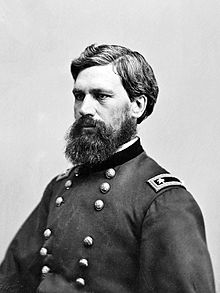Oliver Otis Howard
Oliver Otis Howard (born November 8, 1830 in Leeds , Maine , † October 26, 1909 in Burlington , Vermont ) was a general in the US Army .
Life
1846-1850 he attended Bowdoin College , where he developed the main features of his character. He became a very devout student who noticeably refrained from drinking, swearing, and smoking.
He graduated from West Point Military Academy in 1854 as one of the best in his class. He then served in the Watervliet Arsenal in West Troy, New York (1854–1855); Kennebec Arsenal in Augusta, Maine (1855-1856); and in the 3rd Seminole War (1856–1857). After a brief interlude as a supply officer, he returned to the academy to teach math . He married his childhood girlfriend, Elizabeth Ann Wait. They had 7 children, 5 of them sons and 2 daughters. His considerations to study for a pastorate in the Episcopalian Church became superfluous when the American Civil War broke out.
He remained loyal to the Union and took command of an infantry regiment in his home state. But already during the first battle of Manassas he led a brigade , which was confirmed by his promotion to brigadier general shortly afterwards . He led the brigade during George McClellan's peninsula campaign . He was badly wounded and lost an arm during the Battle of Fair Oaks in the spring of 1862. After his recovery he again led a brigade with which he took part in the Battle of Antietam . For Major General conveyed, he commanded during the Battle of Fredericksburg , a Division . In the spring of 1863 he was with the leadership of the XI. Corps commissioned, which consisted mainly of German-Americans .

The corps was badly defeated in the battle of Chancellorsville and suffered heavy losses at Gettysburg . Together with the XII. Corps it was then transferred to the west, where Howard took part in the Battle of Chattanooga . In the spring of 1864, General Sherman turned him over to IV Corps for the upcoming Atlanta campaign , and after the death of General James B. McPherson , he led the Tennessee Army . Army commander in chief he remained during Sherman's march to the sea and the Carolina campaign .
post war period
After the war, Howard headed the Bureau of Refugees, Freedmen and Abandoned Lands for short called Freedmens Bureau . He was responsible for teaching four million freed slaves with limited financial resources to read and write, training them in manual trades, and protecting them from the fears of whites in the southern states. He negotiated employment contracts, settled disputes, and paid teachers. As soon as he had the money, he supported the schools. The Freedmen Bureau only existed from 1865 to 1871, but Howard spent more than $ 5 million on schooling. During this time he also founded Howard University , which existed in the first few years on the money of the freedmen and of which he was president from 1869 to 1874.
In 1872, he succeeded with the Chiricahua - Apaches under Cochise to make peace. Five years later he carried out a spectacular campaign against the Nez Percé further north . Only after months of persecution, during which the US Army suffered several defeats, did he succeed in confronting the fugitive Indians a few miles from their goal, the border with Canada , and forcing them to surrender (see Nez Percé War ).
Howard was also involved in Republican Party politics, the Congregational Home Missionary Society , the Young Men's Christian Association , the Order of Military Order of the Loyal Legion, and the Congregational Church .
In the following years Howard held various other positions, for example he was director of West Point. In 1894 he retired from military service and devoted himself to writing books. The deeply religious Howard, who had been named Christian Soldier by his soldiers , died on October 26, 1909 in Burlington , Vermont .
According to him, Howard County named in Nebraska.
Publications
- Nez Percé Joseph (1881),
- General Taylor (1892)
- Autobiography of Oliver Otis Howard, major general, United States Army, Vol. I Publisher: The Baker & Taylor Company, New York, 1907
- Autobiography of Oliver Otis Howard, major general, United States Army. Vol. II Publisher: The Baker & Taylor Company, New York, 1907
- My Life and Experiences Among Hostile Indians (1907)
- Famous Indian Chiefs I Have Known (1908).
- Books by Oliver Otis Howard in the Internet Archive - online
literature
- John A. Carpenter: Sword and Olive Branch. Oliver Otis Howard (= The North's Civil War. Vol. 9). Fordham University Press, New York 1999, ISBN 0-8232-1987-9 (New edition of the University of Pittsburgh Press, Pittsburgh 1964 edition).
Web links
- Illustrated biography of Howard
- Report of Brevet Major General OO Howard, Commissioner Bureau of Refugees, Freedmen, and Abandoned Lands, to the Secretary of War: October 20, 1869
- Statement of Br. Maj. Gen. OO Howard before the Committee on Education and Labor in defense against the charges presented by Hon. Fernando Wood, and argument of Edgar Ketchum, esq., Of counsel for Gen. Howard in summing up the case upon the testimony before the Committee (1870)
- The case of Gen. OO Howard, US Army, Washington, DC (1874)
- Oliver Otis Howard in the database of Find a Grave (English)
| personal data | |
|---|---|
| SURNAME | Howard, Oliver Otis |
| ALTERNATIVE NAMES | Christian Soldier (nickname) |
| BRIEF DESCRIPTION | American Army Officer |
| DATE OF BIRTH | November 8, 1830 |
| PLACE OF BIRTH | Leeds , Maine |
| DATE OF DEATH | October 26, 1909 |
| Place of death | Burlington , Vermont |

